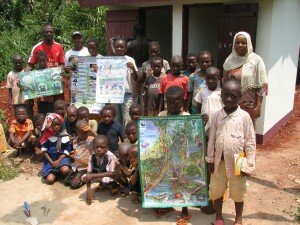By: Kim Koporc, Director, Children Without Worms (CWW)
 Those of us in global health far too often see the consequences that people living in developing countries face because basic human necessities – clean water and sanitation – are not available to them. In addition to causing diarrheal diseases, lack of access to clean water and sanitation is also a culprit in many neglected tropical diseases (NTDs) particularly intestinal worms. Today, World Water Day, serves as a reminder of how much disease could be prevented if people had access to clean water.
Those of us in global health far too often see the consequences that people living in developing countries face because basic human necessities – clean water and sanitation – are not available to them. In addition to causing diarrheal diseases, lack of access to clean water and sanitation is also a culprit in many neglected tropical diseases (NTDs) particularly intestinal worms. Today, World Water Day, serves as a reminder of how much disease could be prevented if people had access to clean water.
Through the partnership with Johnson & Johnson, CWW distributes mebendazole to reach school-age children in eight countries. However, de-worming alone is not enough, so our work focuses on an integrated approach that will not just rid children of worms once they are infected, but break the cycle of infection.
The World Wildlife Fund (WWF) is best known for its conservation work, but it has also been a key partner in our effort to bring Soil Transmitted Helminths (STH) under control in Cameroon because good human health and good environmental health go hand-in-hand.
CWW began collaborating with the World Wildlife Fund’s Population-Health-Environment (WWF-PHE) program in Cameroon to promote the WASHED framework – a comprehensive approach that advocates for access to water, sanitation, hygiene education and de-worming medication to minimize the risk of STH infection. The PHE program works in the southwest of the country, in villages bordering the Lobeke National Park. The program partners with the local government and a Catholic hospital to promote hygiene, access to potable water, improved sanitary latrines and de-worming school-age children, among other health-promoting activities. Continue reading
